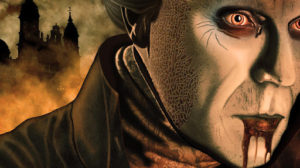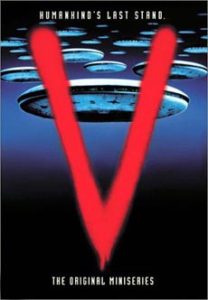How Resident Alien Transforms Shapeshifting Antisemitic Stereotypes — For Good!
Science fiction's antisemitic history and how a new TV series inverts those longstanding anti-Jewish themes
 In pulp and science fiction storytelling, antisemitic stereotypes have long been used as a shorthand for the evil, greedy, villainous alien threat. The new SYFY series Resident Alien is entertaining for at least this Jewish fan in part because it doesn’t so much invert that trope as lean so far into it that it comes out the other side. In the show, Harry Vanderspeigle (played by Alan Tudyk) is an alien who lands in the town of Patience, Colorado and becomes the town doctor. He’s a sneaky, infiltrating, ugly outsider with mind control powers bent on the destruction of all humankind. In short, he’s an antisemitic stereotype. But he’s also the charming, sporadically noble, consistently charismatic hero, who enjoys pizza as much as he enjoys greeting small children with a cheerful “Good morning, dickhead.” Rarely have weird murderous aliens seemed so charming.
In pulp and science fiction storytelling, antisemitic stereotypes have long been used as a shorthand for the evil, greedy, villainous alien threat. The new SYFY series Resident Alien is entertaining for at least this Jewish fan in part because it doesn’t so much invert that trope as lean so far into it that it comes out the other side. In the show, Harry Vanderspeigle (played by Alan Tudyk) is an alien who lands in the town of Patience, Colorado and becomes the town doctor. He’s a sneaky, infiltrating, ugly outsider with mind control powers bent on the destruction of all humankind. In short, he’s an antisemitic stereotype. But he’s also the charming, sporadically noble, consistently charismatic hero, who enjoys pizza as much as he enjoys greeting small children with a cheerful “Good morning, dickhead.” Rarely have weird murderous aliens seemed so charming.
The Jew as weird murderous alien goes back to the Middle Ages, at least. At that time, Christians accused Jews of causing the Black Death by poisoning wells. Gentiles also claimed that Jews used the blood of Christian children in their Passover rituals to make matzah—a conspiracy theory known as the blood libel.

Dracula (Image by Bran Castle)
The association of Jews with foreignness, disease, and ingesting blood was reworked by Bram Stoker in his 1897 novel Dracula. Stoker never specifically identified Dracula as Jewish, but Dracula has a stereotypically Jewish face: a hooked nose, prominent eyebrows, and ugly, sharp features. He is also a foreigner, concerned about his ability to pronounce English correctly, and bent on the appearance of assimilation, even as his fear of the cross demonstrates his inability to ever truly fit into a Christian society.
Dracula corrupts, weakens, and mesmerizes. He spreads a disease which looks like anemia, but which is actually a spiritual sickness. He is repulsive, but seduces women with the hypnotic lure of debasement and power. When Dracula needs to escape England, he turns to a “Hebrew” named Hildesheim, “with a nose like a sheep,” who Stoker depicts as greedy for money, in line with stereotypes of Jewish avarice.
The Nazis made the connection between Jews and vampires even more explicit. Hitler referred to Jews as bloodsuckers, vampires, and “that race which shuns the sunlight” in Mein Kampf. The infamous 1940 Nazi propaganda film The Eternal Jew used imagery comparing Jews to rats swarming on a ship, evoking the famous 1922 German vampire film Nosferatu. A 1943 antisemitic Nazi pamphlet was titled The Jewish Vampire Brings Chaos to the World. For the Nazis, the vampire encapsulated their fears of foreign corrupters disguised among the volk, plotting to bend weak minds to their will and leach away pure Aryan lifeblood.
***
The vision of vampiric Jews was consistent with stereotypical portrayals of Jews as bloodsucking capitalists, draining value from virtuous laborers. Ironically, Jews were also smeared as anti-capitalists at the same time. Antisemites like Henry Ford claimed that 75% of Communists were Jews. Hitler insisted the Russian Communist Revolution was a Jewish plot to take revenge on the Western Christian world.
Since anti-communism was so intertwined with anti-Jewish animus, it should not come as a surprise that Cold War science fiction often relied on vampiric antisemitic tropes to express U.S. antipathy to the Soviet Union. The most famous example is Jack Finney’s 1955 novel The Invasion of the Body Snatchers, in which spores from outer-space invade the earth—like those ugly rats in The Eternal Jew. The invaders rob their victims of initiative and emotion, bending them to an alien will.
Robert Heinlein’s 1951 novel The Puppet Masters is even more explicit. The book is about disgusting vampiric alien invaders from Jupiter’s moon of Titan. They batten onto human backs and take over their minds in a plot to rule the world. Heinlein repeatedly compares the Titans to Communist Russia while describing them with antisemitic stereotypes. Heinlein says “…the titans have no true culture; they are parasitic even in that and merely adapt the culture they find to their own needs.” That’s a description that echoes Hitler’s claim that “The Jew was only and always a parasite in the body of other peoples….”
Did Heinlein intentionally echo antisemitic propaganda? It’s difficult to say. Antisemitic tropes became so embedded in science fiction representations of aliens that they were almost a default. The neo-Nazi William Luther Pierce took advantage of that in his infamous 1978 novel The Turner Diaries to stoke deliberate hatred of Jews; the book is about a white nationalist movement fighting manipulative Jews who are trying to weaken the United States. It reads much like Heinlein without the euphemism.
Other creators picked up the stereotypes unintentionally. John Carpenter’s 1988 film They Live imagines that hideous aliens have infiltrated Earth, using mind control technology to appear human. They also control the media, broadcasting hidden messages in advertising and television that say, “OBEY. CONSUME. CONFORM.” A coalition of resistance fighters based in a church take a stand against the aliens. Carpenter intended the film to be a critique of Reagan-era capitalism. But by making the ruling class into alien infiltrators, he ended up tying into antisemitic narratives that portray capitalism as the imposition of wealthy Jewish bankers who could be defeated by Christians. Neo-Nazis adopted the film and its imagery as their own, much to Carpenter’s horror.
Another 1980s pop culture phenomenon that dabbles with the links between antisemitism and anti-capitalism, rather than anti-communism, is the television series V. The plot, which should by now be familiar, features lizard-like aliens wearing human skin-suits. They invade Earth and (as you have probably guessed) use mind control technology to take over the planet and strip it of its resources. Like vampires, the aliens feed on humans—though in V they eat the whole flesh, not only the blood.
 V subverts its antisemitic implications to some degree. The series presents the invasion of the aliens, and the totalitarian society they impose, as fascist. One of the people who recognizes the danger most clearly is a Jewish survivor of the Holocaust. At the same time, it’s that survivor’s Jewish grandson who becomes the most visible collaborator with the aliens—motivated in part by his lust for a gentile woman. The confused mix of sympathetic and invidious portrayals of Jews is perhaps to be expected in a series that tries to use antisemitic tropes to delegitimize fascism.
V subverts its antisemitic implications to some degree. The series presents the invasion of the aliens, and the totalitarian society they impose, as fascist. One of the people who recognizes the danger most clearly is a Jewish survivor of the Holocaust. At the same time, it’s that survivor’s Jewish grandson who becomes the most visible collaborator with the aliens—motivated in part by his lust for a gentile woman. The confused mix of sympathetic and invidious portrayals of Jews is perhaps to be expected in a series that tries to use antisemitic tropes to delegitimize fascism.
Science fiction antisemitic alienness remains popular and continues to influence the broader political culture. One of the most disturbing recent examples is the QAnon conspiracy theory, which claims that Democrats are harvesting the glands of children to gain long life. This is an obvious and despicable science-fiction-influenced variation on the blood libel.
A less virulent instance can be found in the 2019 film Captain Marvel, which features yet more shape-shifting green aliens, known as the Skrulls. In this case though, the Skrulls aren’t the bad guys; instead, they’re being targeted for extermination by the superpowered, Aryan-like Kree. The film functions as a kind of gentile savior narrative, with the human Captain Marvel fighting to prevent a Skrull genocide.
It’s nice to see antisemitic stereotypes turned around in this way. But while the Skrull aren’t evil, they’re not the heroes either. Like the Jews in Schindler’s List and The Zookeeper’s Wife, they are portrayed mostly as victims. Vampires are evil, but at least they get to strike terror into the hearts of antisemitic Christians who hate them. Skrulls have to sit around and wait to be rescued.
***
Resident Alien offers another option for those of us who don’t want to be cultureless Titans or cowering Skrulls. The alien protagonist, Harry, is defined by many of the recognizable pulp antisemitic tropes. After he lands on earth, he immediately kills the original, human Harry and takes his face and life, like all those parasitic alien vampires before him. He also has mind manipulating technology, so everyone (or almost everyone) sees him as a normal human rather than a four-armed big-eyed vaguely reptilian monstrosity. And, again in line with alien infiltrators before him, Harry has come to Earth to destroy it—as soon as he finds his doomsday device, which he lost when he crash-landed in Patience, Colorado.
Usually alien mastermind’s don’t crash-land, or lose their doomsday devices. That’s an intentional joke. The show plays with expectations about super-intelligent alien masterminds, which are linked to expectations about hyper-intelligent alien Jewish schemers. Harry constantly says he’s smarter than everyone in Patience. “If the universe had a scale for intelligence, humans would land right below lizards,” he chuckles to himself. And he can come across as extremely clever; he’s quick to figure out how the former town doctor died, when the police are baffled.
But at other times Harry’s “intelligence” seems more like ego and bluster. He handles his duties as town doctor by frantically googling diagnoses on his phone; is he super-smart or is he just connected to the internet like everyone else? He also keeps going out on the glacier even though he’s warned over and over that the ice could cave in—which of course it eventually does. Is he a super-villain or a bumbling ignoramus?
 Part of what the show is doing is mixing and matching alien puppet-master antisemitism with a different suite of Jewish stereotypes. Harry is sort of Dracula, but he’s also sort of George Costanza—nebbishy, awkward, and cranky. Alan Tudyk holds his face like it’s a mask that’s about to slip off over his skull and walks with the stiff gate of a man whose underwear is encroaching dangerously on his alien nether regions. His laugh is a sharp repetitive bark signaling social disaster. His dating life is about what you’d expect from someone with that laugh. After he kisses a woman for the first time, he exclaims, terrified, “Ah! It’s rigor mortis! My penis is dying!”
Part of what the show is doing is mixing and matching alien puppet-master antisemitism with a different suite of Jewish stereotypes. Harry is sort of Dracula, but he’s also sort of George Costanza—nebbishy, awkward, and cranky. Alan Tudyk holds his face like it’s a mask that’s about to slip off over his skull and walks with the stiff gate of a man whose underwear is encroaching dangerously on his alien nether regions. His laugh is a sharp repetitive bark signaling social disaster. His dating life is about what you’d expect from someone with that laugh. After he kisses a woman for the first time, he exclaims, terrified, “Ah! It’s rigor mortis! My penis is dying!”
Stereotypes of unmanly Jewish failures are at this point as wearisome as stereotypes of invading vampiric parasites. But putting them together in the same person creates enjoyably odd juxtapositions. Harry may be socially awkward, but he’s also super strong and oddly attractive—like a much less restrained Mr. Spock. He’s planning to destroy the world, but he’s also geekily needy and vulnerable. And instead of being one of those alien predators determined to steal human women, he’s largely terrified of romantic entanglements, emotional or physical. Nonetheless, both are visited upon him when his estranged wife (Elvy Yost) shows up for a couple of episodes. “She had sex with me,” he whines. “On me, at me, in front of me….She made me watch!”
Harry, the human, before he was replaced by an alien, was something of an outsider himself. He was from New York vacationing in Colorado—the big city, big shot doctor slumming in the sticks. If that scenario sounds familiar, it may be because it echoes another beloved sitcom. Many critics have compared Resident Alien to the 1990s semi-classic Northern Exposure, which was about a Jewish doctor setting up practice in a rural Alaskan town.
Northern Exposure played on the quirky contrast between cosmopolitan Jewish New Yorker and rustic conservative Americana—a (much) less ugly form of the Jews-as-foreigners stereotype. Resident Alien at first seems to be about someone who is even more of a fish-out-of-water—or, given the creatures who we learn are Harry’s distant cousins, an octopus out of water.
But in fact Patience, Colorado is no bastion of uniformity. The town includes Black Americans and Muslims. Harry’s medical assistant Asta (Sara Tomko) belongs to Patience’s sizable Ute Native America community—and it’s suggested that her experience there is part of why she gets along with Harry so well. Also, though, she’s a bit of an oddball. “You’re just different. I know what that’s like,” she tells Harry. “Sometimes just feeling human is alien to me.”
In many pulp narratives that draw on antisemitic traditions, foreignness is terrifying. But on Resident Alien, Harry’s foreignness makes him relatable. To be human is to be out of place, which means that Harry is human because he’s an alien. “The human form is confusing,” he says in his clipped, flat tone. “I am often struck with a sharp emptiness inside me. I eat food, but the emptiness doesn’t go away.” You don’t need to be alien, or Jewish, to understand that.
Resident Alien, unfortunately, doesn’t always seem to believe in its own message that aliens are us precisely because they’re aliens. Harry’s people supposedly don’t have emotions, like the body snatchers before them. He has to learn about love and sorrow and loneliness by taking on human form. As with Data or Spock or the antisemitic stereotypes that are the Ferengi in Star Trek, the assimilationist assumption is that outsiders need to learn to be human (reluctantly or otherwise) in order to become better, more compassionate, more moral and more fully realized entities. From this perspective, aliens, robots, and vampires can be welcomed as long as they adapt themselves to America. But the idea that America might change to become more like the alien vampires is never really considered.
Since the show is reimagining antisemitic stereotypes to help define itself, it would be nice if it included a Jewish character or two. Who wouldn’t want to watch Tudyk trade quips with Winona Ryder? Maybe next season. In the meantime, despite a squishy tentacular misstep or two, Resident Alien remains one of the few science fiction shows that turns its back on the antisemitic tradition to embrace its parasitic alien infiltrators and all those who love them.
Noah Berlatsky is the author of Wonder Woman: Bondage and Feminism in the Marston/Peter Comics, 1941/48. He lives in Chicago.